初中英语 反义疑问句的用法归纳
初中英语反义疑问句的用法归纳

反义疑问句(1)反意疑问句要点简述反意疑问句又叫附加疑问句,是在陈述句后,对陈述句所叙述的事实提出的疑问。
反意疑问句后一部分的主谓与前一部分的主谓要保持人称及助动词等方面的一致。
如:It looks like rain, doesn’t it? He doesn’t need to work so late, does he?(2)学习反意疑问句,特别要注意的问题1)陈述部分的主语是this, that时,疑问部分的主语多用it;陈述部分的主语是these, those时,疑问部分的主语多用they。
如:This is a dictionary, isn’t it? Those are shelves, aren’t they?2)陈述句如果是there be结构时,疑问句部分仍用there。
如:There once was a man named Saint Nicholas, wasn’t there?3)在英语口语中,“I am +表语结构”,后面的反意疑问句多用aren’t I来体现。
如:I am very interested in learning English, aren’t I?4)陈述句的主语是动词不定式,动词的-ing形式或从句时,疑问部分的主语多用it来体现。
如:Taking care of our environment is very important, isn’t it? What he said is right, isn’t it?5)陈述句中含有not, no, hardly, neither, never, few, little, too …to等否定词或具有否定意义的词时,疑问部分常用肯定形式。
如:Few people knew the news, did they? Tom has never been to England , has he?但陈述句中如果带有否定意义的前缀和后缀的单词时,整个句子仍视为肯定句,反意疑问部分多用否定形式。
九年级复习:反义疑问句的14种常考特殊用法
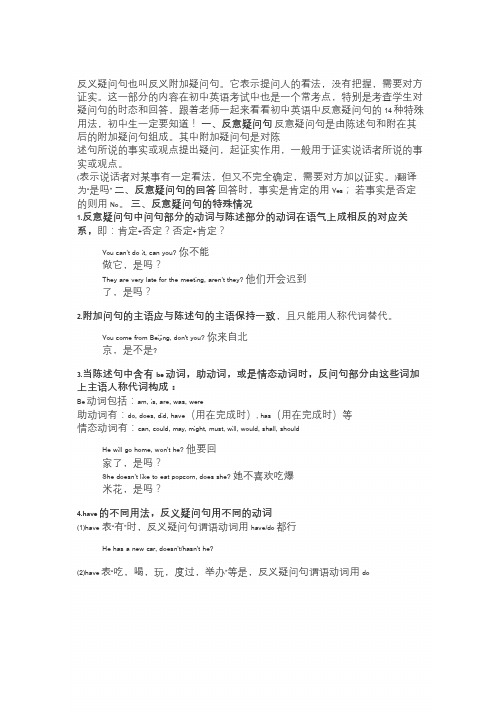
反义疑问句也叫反义附加疑问句。
它表示提问人的看法,没有把握,需要对方证实。
这一部分的内容在初中英语考试中也是一个常考点,特别是考查学生对疑问句的时态和回答,跟着老师一起来看看初中英语中反意疑问句的14种特殊用法,初中生一定要知道!一、反意疑问句反意疑问句是由陈述句和附在其后的附加疑问句组成。
其中附加疑问句是对陈述句所说的事实或观点提出疑问,起证实作用,一般用于证实说话者所说的事实或观点。
(表示说话者对某事有一定看法,但又不完全确定,需要对方加以证实。
)翻译为“是吗” 二、反意疑问句的回答回答时,事实是肯定的用Yes;若事实是否定的则用No。
三、反意疑问句的特殊情况1.反意疑问句中问句部分的动词与陈述部分的动词在语气上成相反的对应关系,即:肯定+否定?否定+肯定?You can’t do it, can you? 你不能做它,是吗?They are very late for the meeting, aren’t they? 他们开会迟到了,是吗?2.附加问句的主语应与陈述句的主语保持一致,且只能用人称代词替代。
You come from Beijing, don't you? 你来自北京,是不是?3.当陈述句中含有be动词,助动词,或是情态动词时,反问句部分由这些词加上主语人称代词构成:Be动词包括:am, is, are, was, were助动词有:do, does, did, have(用在完成时), has(用在完成时)等情态动词有:can, could, may, might, must, will, would, shall, shouldHe will go home, won’t he? 他要回家了,是吗?She doesn’t like to eat popcorn, does she? 她不喜欢吃爆米花,是吗?4.have的不同用法,反义疑问句用不同的动词(1)have 表“有”时,反义疑问句谓语动词用have/do都行He has a new car, doesn’t/hasn’t he?(2)have表“吃,喝,玩,度过,举办”等是,反义疑问句谓语动词用doHe has supper at home every day, doesn’t he?They had a good time in Beijing, didn’t they?(3)have to表“不得不,必须”时,反义疑问句谓语动词用doKite has to help her mother, doesn’t she?(4)had better表“最好”时,反义疑问句谓语动词用hadWe had better go to school at once, hadn't we?(5)have用在完成时中,反义疑问句谓语动词用haveThey have known the matter, haven’t they?5.(1)反意疑问句的陈述部分带有little, few, never, hardly, seldom,nobody,nothing, no one, none, neither等否定意义的词时,问句部分用肯定式。
反义疑问句的14种常考特殊用法
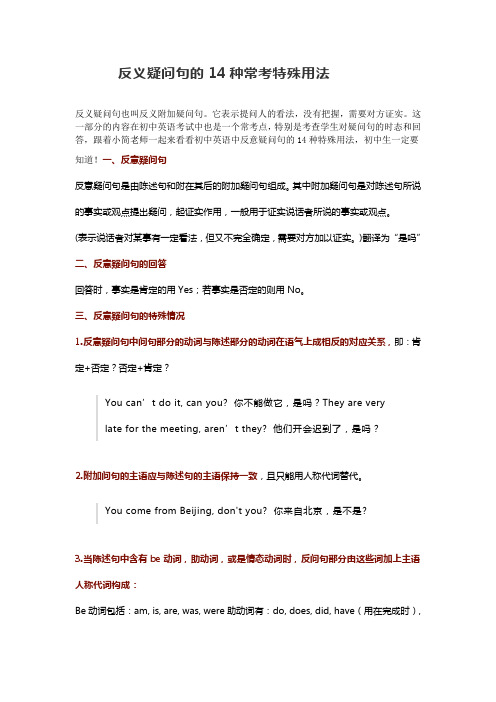
反义疑问句的14种常考特殊用法反义疑问句也叫反义附加疑问句。
它表示提问人的看法,没有把握,需要对方证实。
这一部分的内容在初中英语考试中也是一个常考点,特别是考查学生对疑问句的时态和回答,跟着小简老师一起来看看初中英语中反意疑问句的14种特殊用法,初中生一定要知道!一、反意疑问句反意疑问句是由陈述句和附在其后的附加疑问句组成。
其中附加疑问句是对陈述句所说的事实或观点提出疑问,起证实作用,一般用于证实说话者所说的事实或观点。
(表示说话者对某事有一定看法,但又不完全确定,需要对方加以证实。
)翻译为“是吗”二、反意疑问句的回答回答时,事实是肯定的用Yes;若事实是否定的则用No。
三、反意疑问句的特殊情况1.反意疑问句中问句部分的动词与陈述部分的动词在语气上成相反的对应关系,即:肯定+否定?否定+肯定?You can’t do it, can you? 你不能做它,是吗?They are verylate for the meeting, aren’t they? 他们开会迟到了,是吗?2.附加问句的主语应与陈述句的主语保持一致,且只能用人称代词替代。
You come from Beijing, don't you? 你来自北京,是不是?3.当陈述句中含有be动词,助动词,或是情态动词时,反问句部分由这些词加上主语人称代词构成:Be动词包括:am, is, are, was, were助动词有:do, does, did, have(用在完成时),has(用在完成时)等情态动词有:can, could, may, might, must, will, would, shall, shouldHe will go home, won’t he? 他要回家了,是吗?She doesn’tlike to eat popcorn, does she? 她不喜欢吃爆米花,是吗?4.have的不同用法,反义疑问句用不同的动词(1)have 表“有”时,反义疑问句谓语动词用have/do都行He has a new car, doesn’t/hasn’t he?(2)have表“吃,喝,玩,度过,举办”等是,反义疑问句谓语动词用doHe has supper at home every day, doesn’t he?They had agood time in Beijing, didn’t they?(3)have to表“不得不,必须”时,反义疑问句谓语动词用doKite has to help her mother, doesn’t she?(4)had better表“最好”时,反义疑问句谓语动词用hadWe had better go to school at once, hadn't we?(5)have用在完成时中,反义疑问句谓语动词用haveThey have known the matter, haven’t they?5.(1)反意疑问句的陈述部分带有little, few, never, hardly, seldom,nobody, nothing, no one, none, neither等否定意义的词时,问句部分用肯定式。
英语反义疑问句的14种常考特殊用法,备战中考一定要掌握!
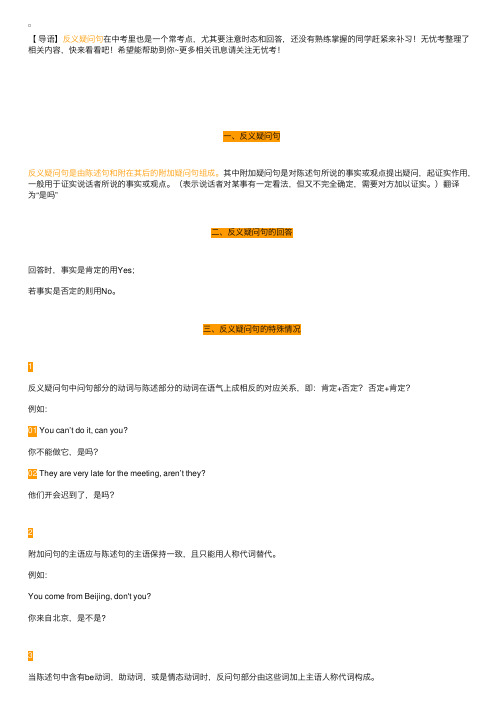
【导语】反义疑问句在中考⾥也是⼀个常考点,尤其要注意时态和回答,还没有熟练掌握的同学赶紧来补习!⽆忧考整理了相关内容,快来看看吧!希望能帮助到你~更多相关讯息请关注⽆忧考!⼀、反义疑问句反义疑问句是由陈述句和附在其后的附加疑问句组成。
其中附加疑问句是对陈述句所说的事实或观点提出疑问,起证实作⽤,⼀般⽤于证实说话者所说的事实或观点。
(表⽰说话者对某事有⼀定看法,但⼜不完全确定,需要对⽅加以证实。
)翻译为“是吗”⼆、反义疑问句的回答回答时,事实是肯定的⽤Yes;若事实是否定的则⽤No。
三、反义疑问句的特殊情况1反义疑问句中问句部分的动词与陈述部分的动词在语⽓上成相反的对应关系,即:肯定+否定?否定+肯定?例如:01 You can’t do it, can you?你不能做它,是吗?02 They are very late for the meeting, aren’t they?他们开会迟到了,是吗?2附加问句的主语应与陈述句的主语保持⼀致,且只能⽤⼈称代词替代。
例如:You come from Beijing, don't you?你来⾃北京,是不是?3当陈述句中含有be动词,助动词,或是情态动词时,反问句部分由这些词加上主语⼈称代词构成。
Be动词包括:am, is, are, was, were助动词有:do, does, did, have(⽤在完成时), has(⽤在完成时)等情态动词有:can, could, may, might, must, will, would, shall, should例如:01 He will go home, won’t he?他要回家了,是吗?02 She doesn’t like to eat popcorn, does she?她不喜欢吃爆⽶花,是吗?4have的不同⽤法,反义疑问句⽤不同的动词。
(1)have表“有”时,反义疑问句谓语动词⽤have/do都⾏。
初中英语反义疑问句用法归纳
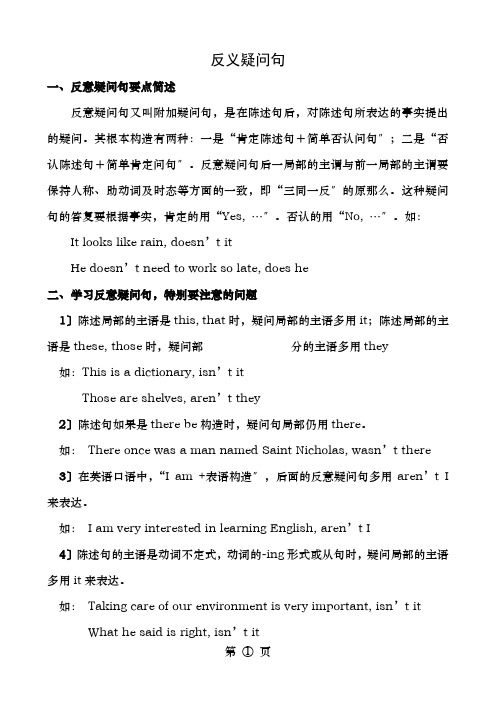
反义疑问句一、反意疑问句要点简述反意疑问句又叫附加疑问句,是在陈述句后,对陈述句所表达的事实提出的疑问。
其根本构造有两种:一是“肯定陈述句+简单否认问句〞;二是“否认陈述句+简单肯定问句〞。
反意疑问句后一局部的主谓与前一局部的主谓要保持人称、助动词及时态等方面的一致,即“三同一反〞的原那么。
这种疑问句的答复要根据事实,肯定的用“Yes, …〞。
否认的用“No, …〞。
如:It looks like rain, doesn’t itHe doesn’t need to work so late, does he二、学习反意疑问句,特别要注意的问题1〕陈述局部的主语是this, that时,疑问局部的主语多用it;陈述局部的主语是these, those时,疑问部分的主语多用they如:This is a dictionary, isn’t itThose are shelves, aren’t they2〕陈述句如果是there be构造时,疑问句局部仍用there。
如:There once was a man named Saint Nicholas, wasn’t there 3〕在英语口语中,“I am +表语构造〞,后面的反意疑问句多用aren’t I 来表达。
如:I am very interested in learning English, aren’t I4〕陈述句的主语是动词不定式,动词的-ing形式或从句时,疑问局部的主语多用it来表达。
如:Taking care of our environment is very important, isn’t it What he said is right, isn’t it5〕陈述句中含有not, no, hardly, neither, never, few, little, too …to等否认词或具有否认意义的词时,疑问局部常用肯定形式。
[精]初中英语-反义疑问句的14种常考特殊用法
![[精]初中英语-反义疑问句的14种常考特殊用法](https://img.taocdn.com/s3/m/5ccc984889eb172dec63b773.png)
初中英语-反义疑问句的14种常考特殊用法一、反意疑问句反意疑问句是由陈述句和附在其后的附加疑问句组成。
其中附加疑问句是对陈述句所说的事实或观点提出疑问,起证实作用,一般用于证实说话者所说的事实或观点。
(表示说话者对某事有一定看法,但又不完全确定,需要对方加以证实。
)翻译为“是吗”二、反意疑问句的回答回答时,事实是肯定的用Yes;若事实是否定的则用No。
三、反意疑问句的特殊情况1.反意疑问句中问句部分的动词与陈述部分的动词在语气上成相反的对应关系,即:肯定+否定?否定+肯定?You can’t do it, can you?你不能做它,是吗?They are very late for the meeting, aren’t they?他们开会迟到了,是吗?2.附加问句的主语应与陈述句的主语保持一致,且只能用人称代词替代。
You come from Beijing, don't you?你来自北京,是不是?3.当陈述句中含有be动词,助动词,或是情态动词时,反问句部分由这些词加上主语人称代词构成:Be动词包括:am, is, are, was, were助动词有:do, does, did, have(用在完成时), has(用在完成时)等情态动词有:can, could, may, might, must, will, would, shall, shouldHe will go home, won’t he?他要回家了,是吗?She doesn’t like to eat popcorn, does she?她不喜欢吃爆米花,是吗?4.have的不同用法,反义疑问句用不同的动词(1)have 表“有”时,反义疑问句谓语动词用have/do都行He has a new car, doesn’t/hasn’t he?(2)have表“吃,喝,玩,度过,举办”等是,反义疑问句谓语动词用doHe has supper at home every day, doesn’t he?They had a good time in Beijing, didn’t they?(3)have to表“不得不,必须”时,反义疑问句谓语动词用doKite has to help her mother, doesn’t she?(4)had better表“最好”时,反义疑问句谓语动词用hadWe had better go to school at once, hadn't we?(5)have用在完成时中,反义疑问句谓语动词用haveThey have known the matter, haven’t they?5.(1)反意疑问句的陈述部分带有little, few, never, hardly, seldom,nobody, nothing, no one, none, neither等否定意义的词时,问句部分用肯定式。
初中英语反义疑问句归纳总结大全

反义疑问句1,反义疑问句的基本形式常见的反义疑问句分为前肯后否和前否后肯两种形式,即如果陈述部分是肯定结构,反义疑问句部分就用否定结构,反之亦然。
反义疑问句部分主要用代词,并与前句主语一致谓语动词在人称,数,和时态上也要与前句一致.He goes to work on foot, doesn’t he?2,反义疑问句部分主语及谓语的确定简略问句部分主语与谓语的确定应以陈述部分的主语和谓语为依据,尤其要注意一些特殊的情况。
同时,简略问句部分的主语一般应用人称代词,而动词若为否定形式,则一般应用缩略形式。
(1)当陈述部分的主语为this, that,则用it。
当these,those时,则用they。
This is a green jeep,isn’t it?Those aren't banana trees, are they?(2)当陈述部分为I am形式时, 附加问句用aren’t I.I'm right, aren’t I?(3)当陈述部分是There be结构时,用be there。
There was an English film yesterday,wasn’t there?(4)当陈述部分有never,seldom,no,few,little, nothing, nobody, hardly,none,too…to。
等表示你否定意义的词时,反义疑问部分用肯定形式。
He seldom goes to the cinema,does he?(5),如果陈述部分含有表示否定意义的由前词缀或后缀构成的词(dislike,unfair,unhappy, careless,unlike,impossible,impolite, impossible等),疑问部分用否定形式。
She dislikes the idea, doesn't she?It’s unfair,isn’t it?(6)主语是不定代词的反义疑问句1)当陈述部分的主语为everthing,nothing,anything, something等指事/物的不定代词时,疑问部分主语用it,而不用they。
(完整版)初中英语 反义疑问句的用法归纳

初一反义疑问句【反义疑问句】(一)概念:反意疑问句是由陈述句和附在其后的附加疑问句组成。
其中附加疑问句是对陈述句所说的事实或观点提出疑问,起证实作用,一般用于证实说话者所说的事实或观点。
(二)要点注意:1、反意疑问句前后两部分谓语应是:“肯定陈述+否定疑问”或“否定陈述+肯定疑问”。
2、简略问句如果是否定式:not应与be,do,will等系动词、助动词、情态动词缩写。
3、简略问句的主语不用名词,应用人称代词。
4、陈述部分含“too...to”时,是否定句。
(三)用法:1) 陈述部分I am时,疑问部分要用aren't I.I'm as tall as your sister,aren't I?(我和你姐姐一样高,对吗?)2) 陈述部分用no, nothing, nobody, never, few, little, seldom, hardly等否定含义的词时,疑问部分用肯定含义。
如:The old man made no answer, did he?Jim is never late for school, is he?3) 陈述部分有情态动词have to +v. (had to + v.),疑问部分常用don't +主语(didn't +主语)。
We have to get there at eight tomorrow, don't we?used to,疑问部分用didn't +主语或usedn't +主语。
He used to take pictures there, didn't he? / usedn't he?had better(最好)+ v. 疑问句部分用hadn't you?You'd better read it by yourself, hadn't you?4) 陈述部分有would rather(宁可、宁愿)+v.,疑问部分多用wouldn't +主语。
(完整版)反义疑问句用法归纳
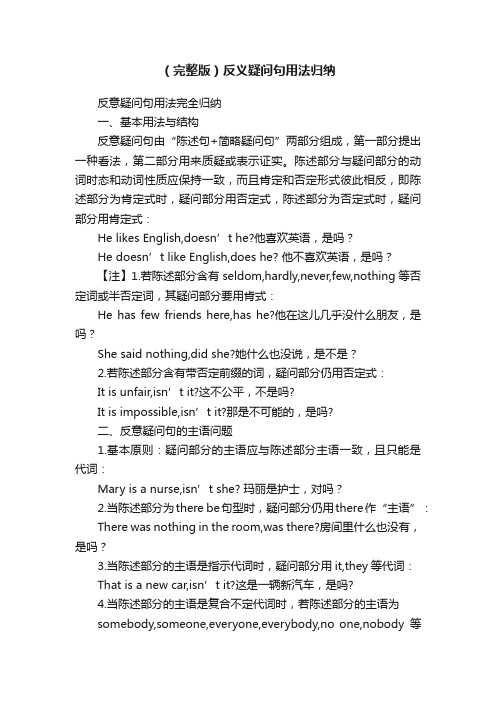
(完整版)反义疑问句用法归纳反意疑问句用法完全归纳一、基本用法与结构反意疑问句由“陈述句+简略疑问句”两部分组成,第一部分提出一种看法,第二部分用来质疑或表示证实。
陈述部分与疑问部分的动词时态和动词性质应保持一致,而且肯定和否定形式彼此相反,即陈述部分为肯定式时,疑问部分用否定式,陈述部分为否定式时,疑问部分用肯定式:He likes English,doesn’t he?他喜欢英语,是吗?He doesn’t like English,does he? 他不喜欢英语,是吗?【注】1.若陈述部分含有seldom,hardly,never,few,nothing等否定词或半否定词,其疑问部分要用肯式:He has few friends here,has he?他在这儿几乎没什么朋友,是吗?She said nothing,did she?她什么也没说,是不是?2.若陈述部分含有带否定前缀的词,疑问部分仍用否定式:It is u nfair,isn’t it?这不公平,不是吗?It is impossible,isn’t it?那是不可能的,是吗?二、反意疑问句的主语问题1.基本原则:疑问部分的主语应与陈述部分主语一致,且只能是代词:Mary is a nurse,isn’t she? 玛丽是护士,对吗?2.当陈述部分为there be句型时,疑问部分仍用there作“主语”:There was nothing in the room,was there?房间里什么也没有,是吗?3.当陈述部分的主语是指示代词时,疑问部分用it,they等代词:That is a new car,isn’t it?这是一辆新汽车,是吗?4.当陈述部分的主语是复合不定代词时,若陈述部分的主语为somebody,someone,everyone,everybody,no one,nobody等复合不定代词,其反意疑问句的主语在正式文体中用he,在口语或非正式文体中通常用they:Nobody was late,were they?没有一个人迟到,是吗?5.当陈述部分的主语是something,anything,nothing,everything等复合不定代词时,其反意疑问句的主语要用it:Everything is ready,isn’t it? 一切都准备好了吗?Nothing is important,is it?没有什么重要的,不是吗?三、陈述部分有动词have的反意疑问句1.当have为助动词时,其反意疑问句沿用同样的助动词:He has already left,hasn’t he?他已经离开了,是吗?2.当have为实意动词时,要分两种情况:①若表示“所有”,反意疑问句可以用have,也可以用do:He has a lot of friends here,hasn’t[doesn’t]he?他在这儿有许多朋友,是吗?但是若陈述部分用的是have的否定式,反意疑问句用have还是用do,取决于陈述部分的动词形式:He hasn’t any money,has he?他没有钱,是吗?He doesn’t have any money,does he?他没有钱,是吗?②若表示“吃”、“玩”等意思,反意疑问句要用do:He has suppe r at5,doesn’t he? 他5点吃晚餐,是吗?He had a good time at the party,didn’t he?他在晚会上玩得很开心,是吗?3.当用于have to时,通常也有两种可能:若表示经常性的行为,则多用加助动词do的形式;若表示特定的行为,则多用have:He often has to get up early,doesn’t he?他经常要早起,是吗?He has to go to bed late tonight,hasn’t he?他今晚要迟睡,是吗?四、含情态动词的反意疑问句1.基本原则:在通常情况下,当陈述部分含有情态动词时,疑问部分会重复前面同样的情态动词:He can speak English,can’t he?他会说英语,是吗?We shouldn’t go,should we?我们不应该去,对不对?2.当陈述部分含有must时,要分两种情况:①若must表示“必须”或“有必要”,疑问部分用mustn’t或needn’t:You must leave at once,mustn’t[needn’t]you?你必须(有必要)马上离开,是吗?但是若陈述部分有mustn’t表示禁止,疑问部分要must:You mustn’t laugh,must you?你不准笑,知道吗?②若must表示推测,疑问部分不能用must,而应根据must后的动词结构采用相应的动词形式:He must be tired,isn’t he?他一定累了,是吗?五、陈述部分为祈使句的反意疑问句1.基本原则:若陈述部分为祈使句,疑问部分通常用will you:Please help us,will you?请帮帮我们,好吗?Come with us,will you?同我们一起去,好吗?Don’t forget to post the letter,will you?请别忘了寄信。
初中英语反意疑问句的知识点
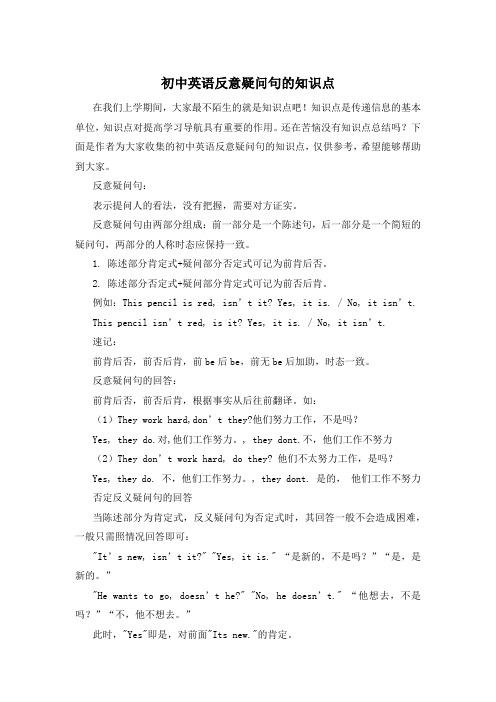
初中英语反意疑问句的知识点在我们上学期间,大家最不陌生的就是知识点吧!知识点是传递信息的基本单位,知识点对提高学习导航具有重要的作用。
还在苦恼没有知识点总结吗?下面是作者为大家收集的初中英语反意疑问句的知识点,仅供参考,希望能够帮助到大家。
反意疑问句:表示提问人的看法,没有把握,需要对方证实。
反意疑问句由两部分组成:前一部分是一个陈述句,后一部分是一个简短的疑问句,两部分的人称时态应保持一致。
1. 陈述部分肯定式+疑问部分否定式可记为前肯后否。
2. 陈述部分否定式+疑问部分肯定式可记为前否后肯。
例如:This pencil is red, isn’t it? Yes, it is. / No, it isn’t.This pencil isn’t red, is it? Yes, it is. / No, it isn’t.速记:前肯后否,前否后肯,前be后be,前无be后加助,时态一致。
反意疑问句的回答:前肯后否,前否后肯,根据事实从后往前翻译。
如:(1)They work hard,don’t they?他们努力工作,不是吗?Yes, they do.对,他们工作努力。
, they dont.不,他们工作不努力(2)They don’t work hard, do they? 他们不太努力工作,是吗?Yes, they do. 不,他们工作努力。
, they dont. 是的,他们工作不努力否定反义疑问句的回答当陈述部分为肯定式,反义疑问句为否定式时,其回答一般不会造成困难,一般只需照情况回答即可:"It’s new, isn’t it?" "Yes, it is." “是新的,不是吗?”“是,是新的。
”"He wants to go, doesn’t he?" "No, he doesn’t." “他想去,不是吗?”“不,他不想去。
英语中反义疑问句的用法归纳

英语中反义疑问句的用法归纳反义疑问句用法归纳一、基本概念反义疑问句由两部分组成:前一部分是一个陈述句,后一部分是一个简短的疑问句,两部分的人称和时态应保持一致。
二、基本用法1. 肯定陈述句 + 否定疑问句例如:You like music, don't you? (你喜欢音乐,不是吗?)2. 否定陈述句 + 肯定疑问句例如:He doesn't like sports, does he? (他不喜欢运动,是吗?)3. 祈使句 + 反义疑问句(1)Let's 开头的祈使句,用 shall we?例如:Let's go for a walk, shall we? (我们去散步,好吗?)(2)Let us 开头的祈使句,用 will you?例如:Let us have a rest, will you? (让我们休息一下,好吗?)(3)其他祈使句,用 will you?例如:Open the door, will you? (打开门,好吗?)4. 含有 must 的反义疑问句(1)must 表示“必须”时,用 needn't例如:You must finish your homework today, needn't you? (你今天必须完成作业,不是吗?)(2)must 表示推测“一定,肯定”时,根据实际情况而定例如:He must be very tired, isn't he? (他一定很累了,不是吗?)5. 含有否定词的反义疑问句当陈述句中有 never, few, little, nothing, nobody 等否定词时,反义疑问句用肯定形式。
例如:There is nothing in the box, is there? (盒子里什么都没有,是吗?)三、固定搭配1. “I am + 表语”,反义疑问句用“aren't I”例如:I'm late, aren't I? (我迟到了,不是吗?)2. 陈述部分是“there be”结构,反义疑问句用“be there”例如:There is a book on the desk, isn't there? (桌子上有一本书,不是吗?)3. 当陈述部分主语是不定代词 everyone, somebody, nobody, everyone 等时,反义疑问句用 they 或 he例如:Everyone is here, aren't they? (大家都在这儿,不是吗?)4. 当陈述部分主语是 this, that 时,反义疑问句用 it;当陈述部分主语是 these, those 时,反义疑问句用 they例如:This is a pen, isn't it? (这是一支钢笔,不是吗?)5. 当陈述部分是主从复合句时,反义疑问句与主句的主语和谓语保持一致例如:He said he would come, didn't he? (他说他会来,不是吗?)双语例句:1. I have a lot of friends, don't I? (我有很多朋友,不是吗?)2. She doesn't speak French, does she? (她不会说法语,是吗?)3. Have a cup of coffee, will you? (喝杯咖啡,好吗?)4. We should study hard, shouldn't we? (我们应该努力学习,不是吗?)5. They have been to Beijing, haven't they? (他们去过北京,不是吗?)6. You aren't a doctor, are you? (你不是医生,对吧?)7. There are some apples on the tree, aren't there? (树上有一些苹果,不是吗?)8. Nobody knows the answer, do they? (没人知道答案,对吧?)9. This isn't your book, is it? (这不是你的书,对吧?)10. Those are beautiful flowers, aren't they? (那些是漂亮的花,不是吗?)11. He can swim very well, can't he? (他游泳游得很好,不是吗?)12. She never tells lies, does she? (她从不说谎,对吧?)13. We had a great time yesterday, didn't we? (我们昨天玩得很开心,不是吗?)14. If it rains tomorrow, we won't go hiking, will we? (如果明天下雨,我们就不去徒步了,对吧?)15. You think he is right, don't you? (你认为他是对的,不是吗?)16. Mary has few friends here, does she? (玛丽在这儿几乎没朋友,对吧?)17. The boy doesn't like vegetables, does he? (这男孩不喜欢蔬菜,是吗?)18. Everyone wants to be happy, don't they? (每个人都想快乐,不是吗?)19. I'm a good student, aren't I? (我是个好学生,不是吗?)20. He told you the truth, didn't he? (他告诉你真相了,不是吗?)。
2024年初中英语语法一轮复习之反义疑问句用法归纳
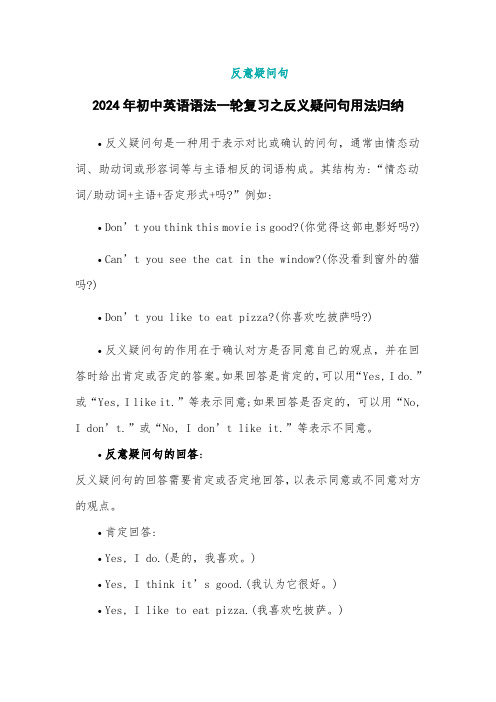
反意疑问句2024年初中英语语法一轮复习之反义疑问句用法归纳•反义疑问句是一种用于表示对比或确认的问句,通常由情态动词、助动词或形容词等与主语相反的词语构成。
其结构为:“情态动词/助动词+主语+否定形式+吗?”例如:•Don’t you think this movie is good?(你觉得这部电影好吗?) •Can’t you see the cat in the window?(你没看到窗外的猫吗?)•Don’t you like to eat pizza?(你喜欢吃披萨吗?)•反义疑问句的作用在于确认对方是否同意自己的观点,并在回答时给出肯定或否定的答案。
如果回答是肯定的,可以用“Yes, I do.”或“Yes, I like it.”等表示同意;如果回答是否定的,可以用“No, I don’t.”或“No, I don’t like it.”等表示不同意。
•反意疑问句的回答:反义疑问句的回答需要肯定或否定地回答,以表示同意或不同意对方的观点。
•肯定回答:•Yes, I do.(是的,我喜欢。
)•Yes, I think it’s good.(我认为它很好。
)•Yes, I like to eat pizza.(我喜欢吃披萨。
)•否定回答:•No, I don’t.(不,我不喜欢。
)•No, I don’t think it’s good.(不,我觉得它不好。
)•No, I don’t like to eat pizza.(不,我不喜欢吃披萨。
) •需要注意的是,在回答反义疑问句时,应该使用正确的语法和标点符号,以确保回答的准确性和清晰度。
回答反义疑问句的原则回答反义疑问句的原则是:肯定回答用“Yes, I do.”或“Yes, I think it’s good.”等表示同意;否定回答用“No, I don’t.”或“No, I don’t think it’s good.”等表示不同意。
初中英语反义疑问句的用法归纳

初一反义疑问句【反义疑问句】〔一〕概念: 反意疑问句是由陈述句和附在其后的附加疑问句组成。
其中附加疑问句是对陈述句所说的事实或观点提出疑问, 起证实作用, 一般用于证实说话者所说的事实或观点。
〔二〕要点注意:1.反意疑问句前后两局部谓语应是: “肯定陈述+否认疑问〞或“否认陈述+肯定疑问〞。
2.简单问句如果是否认式: not应与be, do, will等系动词、助动词、情态动词缩写。
3.简单问句的主语不用名词, 应用人称代词。
4、陈述局部含“too...to〞时, 是否认句。
〔三〕用法:1) 陈述局部I am时, 疑问局部要用aren't I.I'm as tall as your sister, aren't I" 〔我和你姐姐一样高, 对吗?〕2) 陈述局部用no, nothing, nobody, never, few, little, seldom, hardly等否认含义的词时, 疑问局部用肯定含义。
如:The old man made no answer, did he"Jim is never late for school, is he"3) 陈述局部有情态动词have to +v.(had to + v.), 疑问局部常用don't +主语〔didn't +主语〕。
We have to get there at eight tomorrow, don't we"used to, 疑问局部用didn't +主语或usedn't +主语。
He used to take pictures there, didn't he" / usedn't he"had better〔最好〕+ v.疑问句局部用hadn't you"You'd better read it by yourself, hadn't you"4) 陈述局部有would rather〔宁可、宁愿〕+v., 疑问局部多用wouldn't +主语。
(完整版)初中英语反义疑问句用法归纳
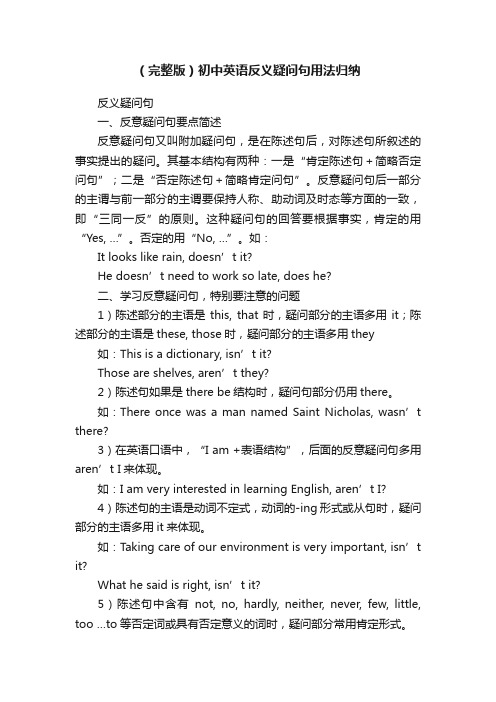
(完整版)初中英语反义疑问句用法归纳反义疑问句一、反意疑问句要点简述反意疑问句又叫附加疑问句,是在陈述句后,对陈述句所叙述的事实提出的疑问。
其基本结构有两种:一是“肯定陈述句+简略否定问句”;二是“否定陈述句+简略肯定问句”。
反意疑问句后一部分的主谓与前一部分的主谓要保持人称、助动词及时态等方面的一致,即“三同一反”的原则。
这种疑问句的回答要根据事实,肯定的用“Yes, …”。
否定的用“No, …”。
如:It looks like rain, doesn’t it?He doesn’t need to work so late, does he?二、学习反意疑问句,特别要注意的问题1)陈述部分的主语是this, that时,疑问部分的主语多用it;陈述部分的主语是these, those时,疑问部分的主语多用they 如:This is a dictionary, isn’t it?Those are shelves, aren’t they?2)陈述句如果是there be结构时,疑问句部分仍用there。
如:There once was a man named Saint Nicholas, wasn’t there?3)在英语口语中,“I am +表语结构”,后面的反意疑问句多用aren’t I来体现。
如:I am very interested in learning English, aren’t I?4)陈述句的主语是动词不定式,动词的-ing形式或从句时,疑问部分的主语多用it来体现。
如:Taking care of our e nvironment is very important, isn’t it?What he said is right, isn’t it?5)陈述句中含有not, no, hardly, neither, never, few, little, too …to等否定词或具有否定意义的词时,疑问部分常用肯定形式。
初中英语反义疑问句的用法归纳
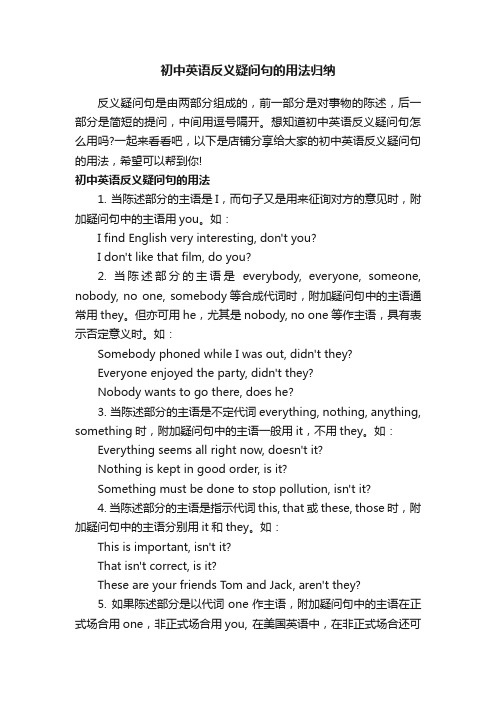
初中英语反义疑问句的用法归纳反义疑问句是由两部分组成的,前一部分是对事物的陈述,后一部分是简短的提问,中间用逗号隔开。
想知道初中英语反义疑问句怎么用吗?一起来看看吧,以下是店铺分享给大家的初中英语反义疑问句的用法,希望可以帮到你!初中英语反义疑问句的用法1. 当陈述部分的主语是I,而句子又是用来征询对方的意见时,附加疑问句中的主语用you。
如:I find English very interesting, don't you?I don't like that film, do you?2. 当陈述部分的主语是everybody, everyone, someone, nobody, no one, somebody等合成代词时,附加疑问句中的主语通常用they。
但亦可用he,尤其是nobody, no one等作主语,具有表示否定意义时。
如:Somebody phoned while I was out, didn't they?Everyone enjoyed the party, didn't they?Nobody wants to go there, does he?3. 当陈述部分的主语是不定代词everything, nothing, anything, something时,附加疑问句中的主语一般用it,不用they。
如:Everything seems all right now, doesn't it?Nothing is kept in good order, is it?Something must be done to stop pollution, isn't it?4. 当陈述部分的主语是指示代词this, that或these, those时,附加疑问句中的主语分别用it和they。
如:This is important, isn't it?That isn't correct, is it?These are your friends Tom and Jack, aren't they?5. 如果陈述部分是以代词one作主语,附加疑问句中的主语在正式场合用one,非正式场合用you, 在美国英语中,在非正式场合还可以用he。
反义疑问句用法归纳详解

反义疑问句用法归纳详解反义疑问句也叫反义附加疑问句。
它表示提问人的看法,没有把握,需要对方证实。
这一部分的内容在初中英语考试中也是一个常考点,特别是考查学生对疑问句的时态和回答,跟着老师一起来看看初中英语中反意疑问句的14种特殊用法,初中生一定要知道!一、反意疑问句反意疑问句是由陈述句和附在其后的附加疑问句组成。
其中附加疑问句是对陈述句所说的事实或观点提出疑问,起证实作用,一般用于证实说话者所说的事实或观点。
(表示说话者对某事有一定看法,但又不完全确定,需要对方加以证实。
)翻译为“是吗”二、反意疑问句的回答回答时,事实是肯定的用Yes;若事实是否定的则用No。
三、反意疑问句的特殊情况1.反意疑问句中问句部分的动词与陈述部分的动词在语气上成相反的对应关系,即:肯定+否定?否定+肯定?You can’t do it, can you?你不能做它,是吗?They are very late for the meeting, aren’t they?他们开会迟到了,是吗?2.附加问句的主语应与陈述句的主语保持一致,且只能用人称代词替代。
You come from Beijing, don't you?你来自北京,是不是?3.当陈述句中含有be动词,助动词,或是情态动词时,反问句部分由这些词加上主语人称代词构成:Be动词包括:am, is, are, was, were助动词有:do, does, did, have(用在完成时), has(用在完成时)等情态动词有:can, could, may, might, must, will, would, shall, should He will go home, won’t he?他要回家了,是吗?She doesn’t like to eat popcorn, does she?她不喜欢吃爆米花,是吗?4.have的不同用法,反义疑问句用不同的动词(1)have 表“有”时,反义疑问句谓语动词用have/do都行He has a new car, doesn’t/hasn’t he?(2)have表“吃,喝,玩,度过,举办”等是,反义疑问句谓语动词用doHe has supper at home every day, doesn’t he?They had a good time in Beijing, didn’t they?(3)have to表“不得不,必须”时,反义疑问句谓语动词用doKite has to help her mother, doesn’t she?(4)had better表“最好”时,反义疑问句谓语动词用hadWe had better go to school at once, hadn't we?(5)have用在完成时中,反义疑问句谓语动词用haveThey have known the matter, haven’t they?5.(1)反意疑问句的陈述部分带有little, few, never, hardly, seldom,nobody, nothing, no one, none, neither等否定意义的词时,问句部分用肯定式。
英语反义疑问句的用法归纳总结
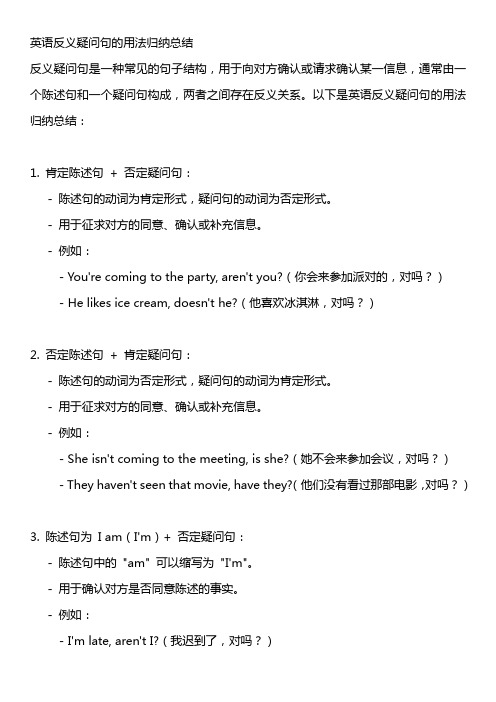
英语反义疑问句的用法归纳总结反义疑问句是一种常见的句子结构,用于向对方确认或请求确认某一信息,通常由一个陈述句和一个疑问句构成,两者之间存在反义关系。
以下是英语反义疑问句的用法归纳总结:1. 肯定陈述句+ 否定疑问句:- 陈述句的动词为肯定形式,疑问句的动词为否定形式。
- 用于征求对方的同意、确认或补充信息。
- 例如:- You're coming to the party, aren't you?(你会来参加派对的,对吗?)- He likes ice cream, doesn't he?(他喜欢冰淇淋,对吗?)2. 否定陈述句+ 肯定疑问句:- 陈述句的动词为否定形式,疑问句的动词为肯定形式。
- 用于征求对方的同意、确认或补充信息。
- 例如:- She isn't coming to the meeting, is she?(她不会来参加会议,对吗?)- They haven't seen that movie, have they?(他们没有看过那部电影,对吗?)3. 陈述句为I am(I'm)+ 否定疑问句:- 陈述句中的"am" 可以缩写为"I'm"。
- 用于确认对方是否同意陈述的事实。
- 例如:- I'm late, aren't I?(我迟到了,对吗?)4. 陈述句中有情态动词+ 肯定疑问句:- 陈述句中有情态动词(如can, could, will, would, should, must等),疑问句的情态动词要与陈述句保持一致。
- 用于确认对方是否同意或能够遵从陈述中的情态动词。
- 例如:- He can swim, can't he?(他会游泳,对吗?)- You will help me, won't you?(你会帮助我,对吗?)5. 陈述句中没有情态动词+ 肯定疑问句:- 陈述句中没有情态动词,疑问句使用"do/does/did" 作为助动词,并保持句子时态一致。
- 1、下载文档前请自行甄别文档内容的完整性,平台不提供额外的编辑、内容补充、找答案等附加服务。
- 2、"仅部分预览"的文档,不可在线预览部分如存在完整性等问题,可反馈申请退款(可完整预览的文档不适用该条件!)。
- 3、如文档侵犯您的权益,请联系客服反馈,我们会尽快为您处理(人工客服工作时间:9:00-18:30)。
初一反义疑问句【反义疑问句】(一)概念:反意疑问句是由陈述句和附在其后的附加疑问句组成。
其中附加疑问句是对陈述句所说的事实或观点提出疑问,起证实作用,一般用于证实说话者所说的事实或观点。
(二)要点注意:1、反意疑问句前后两部分谓语应是:“肯定陈述+否定疑问”或“否定陈述+肯定疑问”。
2、简略问句如果是否定式:not应与be,do,will等系动词、助动词、情态动词缩写。
3、简略问句的主语不用名词,应用人称代词。
4、陈述部分含“too...to”时,是否定句。
(三)用法:1) 陈述部分I am时,疑问部分要用 aren't I.I'm as tall as your sister,aren't I (我和你姐姐一样高,对吗)2) 陈述部分用 no, nothing, nobody, never, few, little, seldom, hardly等否定含义的词时,疑问部分用肯定含义。
如: The old man made no answer, did heJim is never late for school, is he3) 陈述部分有情态动词have to +v. (had to + v.),疑问部分常用don't +主语(didn't +主语)。
We have to get there at eight tomorrow, don't weused to,疑问部分用didn't +主语或 usedn't +主语。
He used to take pictures there, didn't he / usedn't hehad better(最好) + v. 疑问句部分用hadn't youYou'd better read it by yourself, hadn't you4) 陈述部分有would rather(宁可、宁愿) +v.,疑问部分多用 wouldn't +主语。
He would rather read it ten times than recite it, wouldn't he5 陈述部分有You'd like to +v. 疑问部分用wouldn't +主语。
You'd like to go with me, wouldn't you6) 陈述部分主语是指示代词或不定代词everything, that, nothing, this, 疑问部分主语用it。
Everything is ready, isn't it陈述部分主语是不定代词everybody, anyone, somebody, nobody, no one等,疑问部分常用复数they,有时也用单数he.Everyone knows the answer, don't they (doesn’t he)Nobody knows about it, do they (does he)7) think引导的宾语从句:A.主语是第一人称I don't think he is bright, is heWe believe she can do it better, can't she1111B. 如果主语不是第一人称则疑问部分与主句相对应构成反意疑问句He thought they were wrong, didn't he (不能说weren't they)8) 省去主语的祈使句的反意疑问句,疑问部分用will you。
Don't do that again, will youGo with me, will you / won't you而Let us 开头的祈使句,后用will you(或won't you)Let's go and listen to the music, shall we(或用shan't we)Let us wait for you in the reading-room, will you (或won't you)9) 陈述部分是"there be"结构的,疑问部分用there。
There is something wrong with your watch, isn't thereThere will not be any trouble, will there10) 否定前缀不能视为否定词,其反意疑问句仍用否定形式。
It is impossible, isn't it He is not unkind to his classmates, is he例题()1. Don’t forget to give Polly some food and change her water, _______A. shall weB. will youC. won’t youD. do you()2. There is little juice in the glass, _________A. is thereB. isn’t thereC. is it()3. ---He’s seldom late for school, ___________ ---No. He is used to going to school early.A. isn’t heB. has heC. hasn’t heD. is he() bus is always late, _________ ---Sure, it is.A. is not itB. isn’t itC. isn’t the busD. doesn’t it()’re new here, ________ ----Yes, I’m from Dujiangyan. I came here last week.A. do youB. don’t youC. are youD. aren’t you()6. You used to be outgoing,A. do youB. don’t youC. didn’t youD. did you()7. He has never watched such an important match , _____ heA. hasn'tB. hasC. isD. isn't() have to work at once,______ theyA. haveB. haven'tC. doD. don't()9. She often feels tired,______ sheA. doesn'tB. doesC. isD. isn't()10. Let's take a short rest, ______A. do weB. aren't weC. will youD. shall we()11. Hundreds of people lost their lives in the accident,_______ they2222v1.0 可编辑可修改A. don'tB. didn'tC. doD. did()12. ---Lily didn't come to school, did she---____. She was ill in bed.A. No, she didB. Yes, she did.C. No, she didn't.D. Yes, she didn't() isn't a teacher, is she---_____. She works in a hospital.A. No, she isB. Yes, she is.C. No, she isn't.D. Yes, she isn't() looks like Lucy,_______A. is LilyB. isn't sheC. does LillyD. doesn't she() often has lunch at school,_____A. doesn't TomB. doesn't heC. does TomD. doesn't he练习() hardly hurt himself in the accident___________A. doesn’t heB. didn’t heC. did heD. does he()2. Let’s search the Internet for some information about famous people,______A. will youB. won’t youC. shall we()3.Eric’s never seen a three-D movie at the cinema,_______A.hasn’t he B.has he C.isn’t he D.is he()didn’t go to the lecture this morning, did he----______. Though he was not feeling very well.A. No, he didn’t.B. Yes, he did.C. No, he did.D. Yes, he didn’t.()5.—He’s already back to Australia, _________— _________. He is on a visit to Shanghai.A. isn’t he; NoB. hasn’t he; YesC. isn’t he; YesD. hasn’t he; No()6.—She doesn’t like geography, does she—___________ .A. Yes, she doesB. Yes,she doesn’tC. No, shedoes()7. He’s flown to Hainan for a holiday, _______ heA. isn’tB. hasn’tC. wasn’t()8. ---- Let’s go skating,_______ ---- OK. Let’s go.A. do youB. don’t youC. will youD. shall we()9. ---There is little milk in the milk bag, ________ there ---OK. I’ll get you a new bag.A. isB. isn’tC. aren’tD. are()10. Bob, you watched the fashion show last night, ________A. weren’t youB. didn’t youC. haven’t youD. won’t you()11. ---Are you going to the picnic with us tonight3333---Yes. ---You wo n’t be late, ________()12. There is no important information in the newspaper, _______A. isn’t thereB. is itC. is there()13. There are two libraries in this city, _______A. aren’t thereB. aren’t theyC. are two()14. Mom, my grandfather goes for a walk after supper every day, _______A. does heB. is heC. doesn’t heD. isn’t he()15. Liu Qian has made “magic” a hot word, _______ heA. doesn’tB. didn’tC. hasn’tD. isn’t()aren’t a professional athlete, are you---______. I am just a football fan.A. Yes, I amB. No, I’m notC. Of courseD. Sometimes()17. ---Millions of people know about Susan Boyle now, _______----_______, she becomes well-known because of her success on Britain’s Got Talent.A. do they; NoB. do they; YesC. don’t they; NoD. don’t they; Yes()18. He’s fed the dog and the cat, _______A. doesn’t heB. isn’t heC. wasn’t heD. hasn’t he()19. John, clean your room, _______A. will youB. shall weC. don’t youD. doesn’t he()20. I don’t think she has gone to Beijing, _______A. has sheB. hasn’t sheC. do ID. don’t I典型例题:1B2A。
